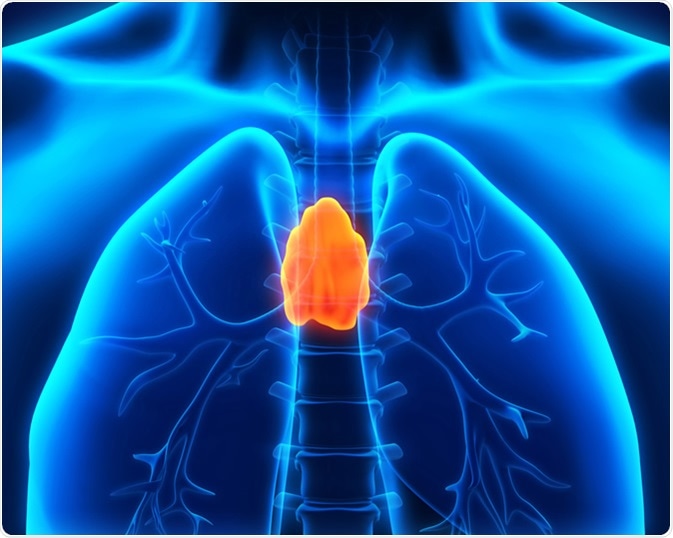Skip to
Thymomas and thymic carcinomas are rare tumors of the thymus – a tiny organ which is responsible for producing white blood cells. These conditions are characterized by cancer cells that grow on the outer surface of the thymus.
The tumor cells in thymoma grow gradually and rarely metastasize (or spread) beyond the thymus. Thymoma cells look similar to the normal thymus cells. Thymoma is frequently accompanied by autoimmune diseases such as myasthenia gravis, hypogammaglobulinemia and acquired pure red cell aplasia.
Thymic carcinomas are epithelial tumors with a high propensity to relapse, and are also associated with an increased mortality risk. The tumor cells in thymic cancer have histological features which are different from the normal thymus cells. Thymic carcinoma cells grow rapidly and also spread to adjacent body parts. By the time the tumor is diagnosed, it may have invaded other areas; this makes thymic cancer much harder to treat.
The exact etiology of thymoma or thymic carcinoma is not known, however, it is usually detected in people between 40 to 60 years of age. The condition is not hereditary and African-Americans are known to be more susceptible to these tumors.

Human Thymus location. Image Credit: Nerthuz / Shutterstock
What are the symptoms of thymoma or thymic carcinoma?
Most patients with thymoma or thymic carcinoma are asymptomatic at the time of diagnosis and the condition is usually detected by chance during examinations such as chest X-rays. Persistent coughing, chest pain and respiratory congestion are some typical clinical symptoms suggestive of thymus mass or abnormal cell growth. Loss of appetite, harsh voice, and problems with swallowing are some other signs indicative of thymoma and thymic carcinoma.
In some cases, the tumor mass may compress or block the superior vena cava – an important vein which carries blood to the heart. This severe condition, termed superior vena cava syndrome, can lead to further complications and, hence, warrants prompt treatment. Facial swelling, headache, dizziness and swollen neck are some common symptoms of superior vena cava syndrome.
How is thymus cancer detected?
Diagnosis of thymoma or thymic carcinoma is usually done by recognizing the specific signs and symptoms of the condition. There is no specific test for this type of cancer; the physician has to take a complete medical history and may check the patient’s family history.
Various imaging techniques such as X-ray, computed tomography (CT), magnetic resonance imaging (MRI) and positron emission tomography (PET) can be used to detect cancerous cells. On detecting abnormalities, the doctor may recommend a biopsy to further confirm the diagnosis.
Pathology Insights: Basics of Thymic Pathology with Sanjay Mukhopadhyay, MD
What are the treatment options for thymus cancer?
Treatment strategy for thymus cancer is decided after considering the extent or stage of the cancer. The patients’ medical history and general health are also taken into account. The treatment options may include one of the following:
Surgery
Surgery is the most common approach used to treat thymus cancer. The resectability of the tumor is assessed before surgery. Thymectomy involves complete removal of the thymus gland; if the tumor has invaded other body parts, surgery is done to remove those parts too. In advanced stages of cancer, surgery may not be able to remove the tumor completely. In such cases, adjuvant therapy such as radiation and chemotherapy is generally recommended. Adjuvant therapy helps to lower the risk of cancer coming back.
Radiation therapy
External beam radiation therapy (EBRT) is usually used to treat thymic cancer. EBRT delivers high-energy radiation to destroy the tumor. In short, EBRT specifically targets tumor cells and thus prevents damage to normal cells.
Chemotherapy
Chemotherapy entails the use of pharmacological agents to stop the growth of cancer cells. These agents may be given orally or intravenously and are, therefore, useful to treat tumor which has spread. Usually, combinations of different chemotherapeutic agents are used to achieve the best results. Chemotherapy can also be used as a neoadjuvant therapy before surgery in order to shrink the tumor.
Thymoma and thymic carcinoma have a high rate of recurrence. This means the cancer has a high probability of coming back after being treated. Cancer may recur in the thymus itself or may invade new parts of the body. Hence, regular check-ups and life-long follow-ups are highly recommended.
Further Reading
Last Updated: May 20, 2019